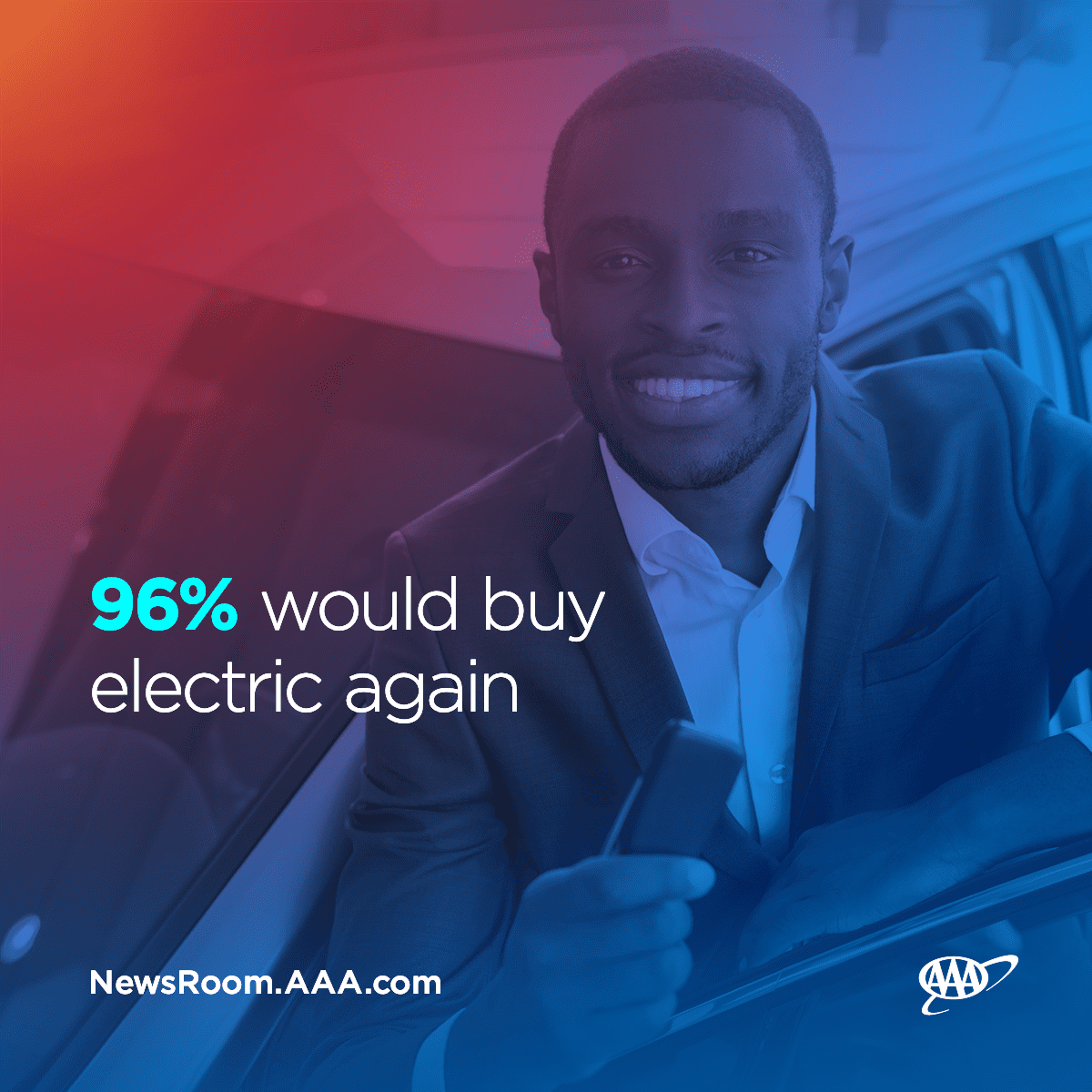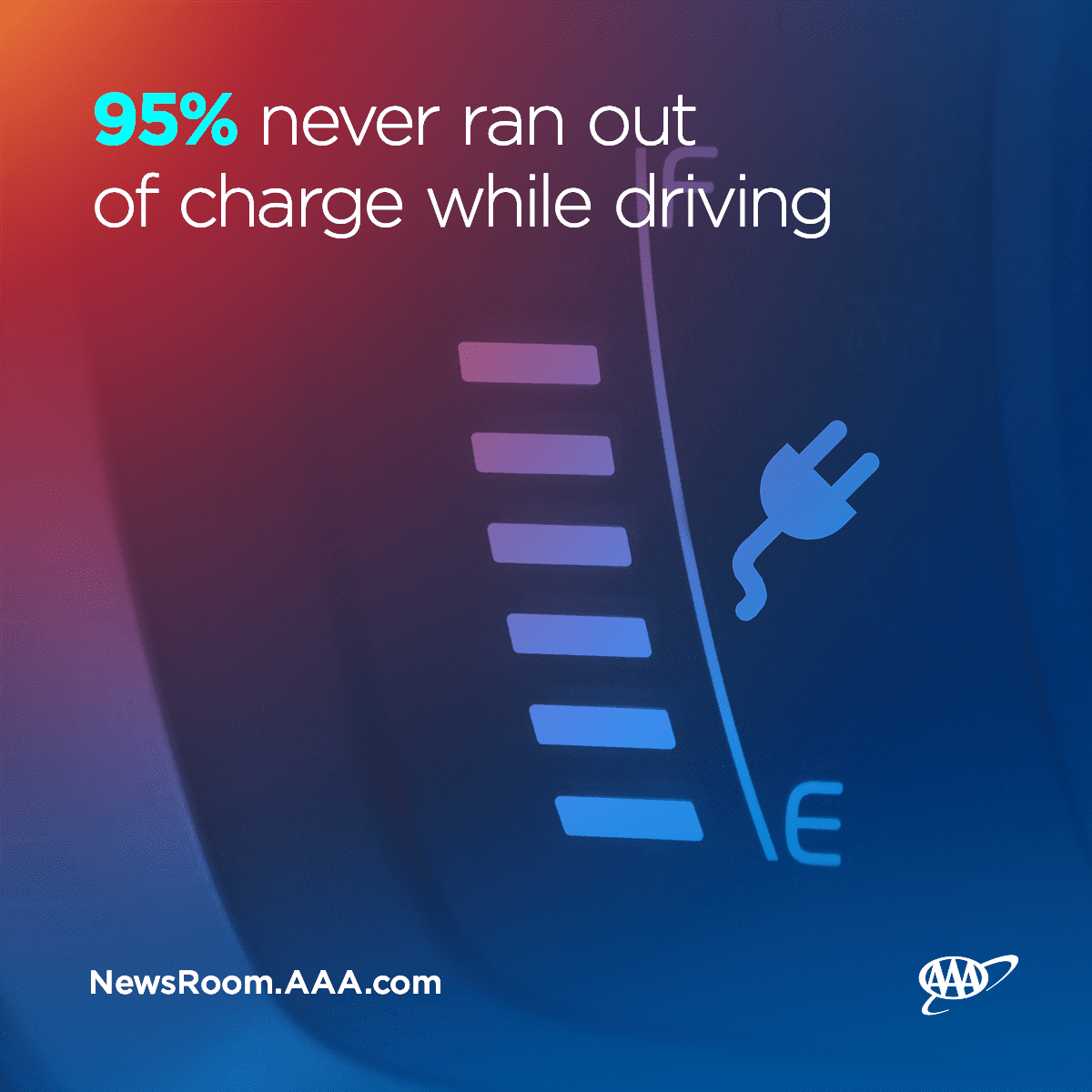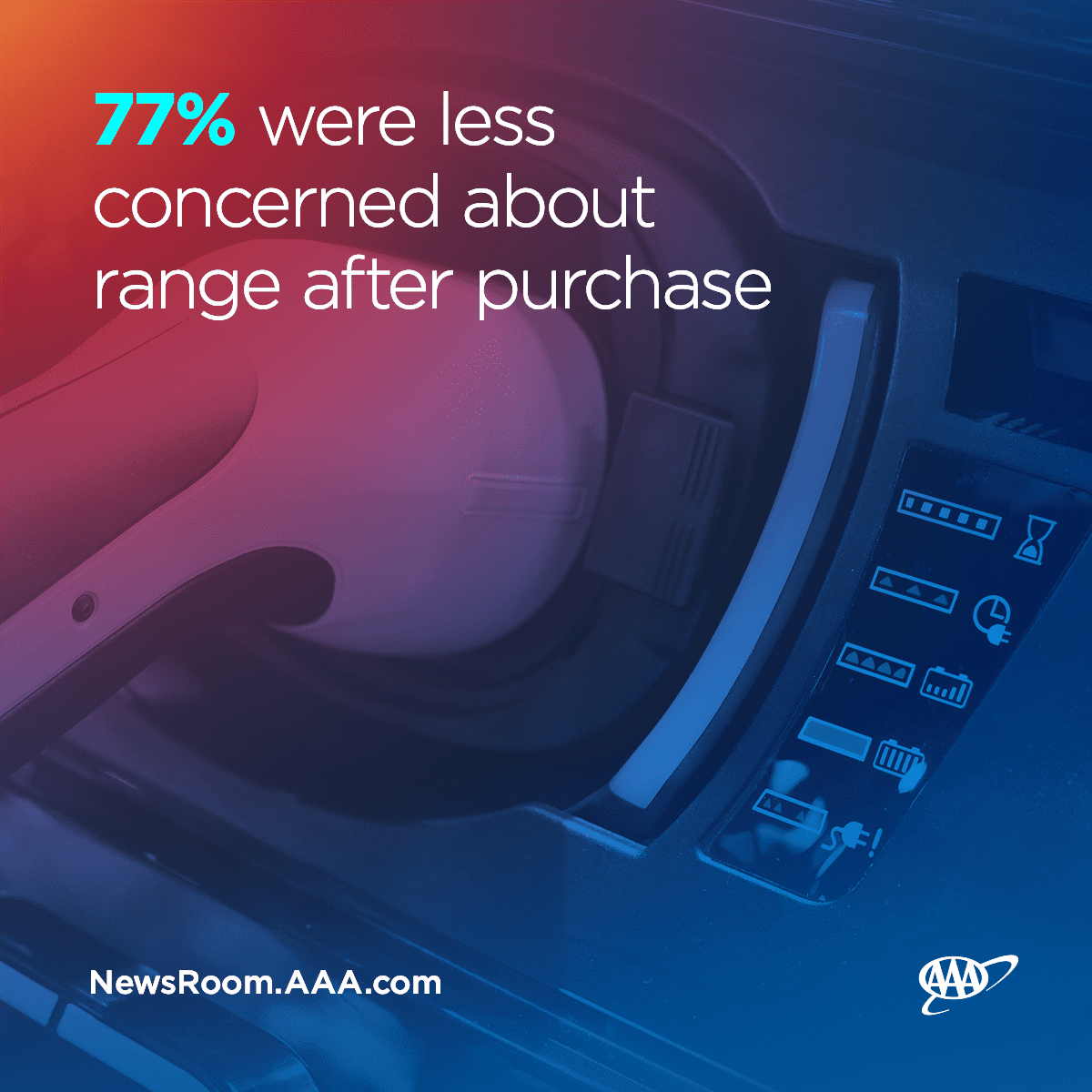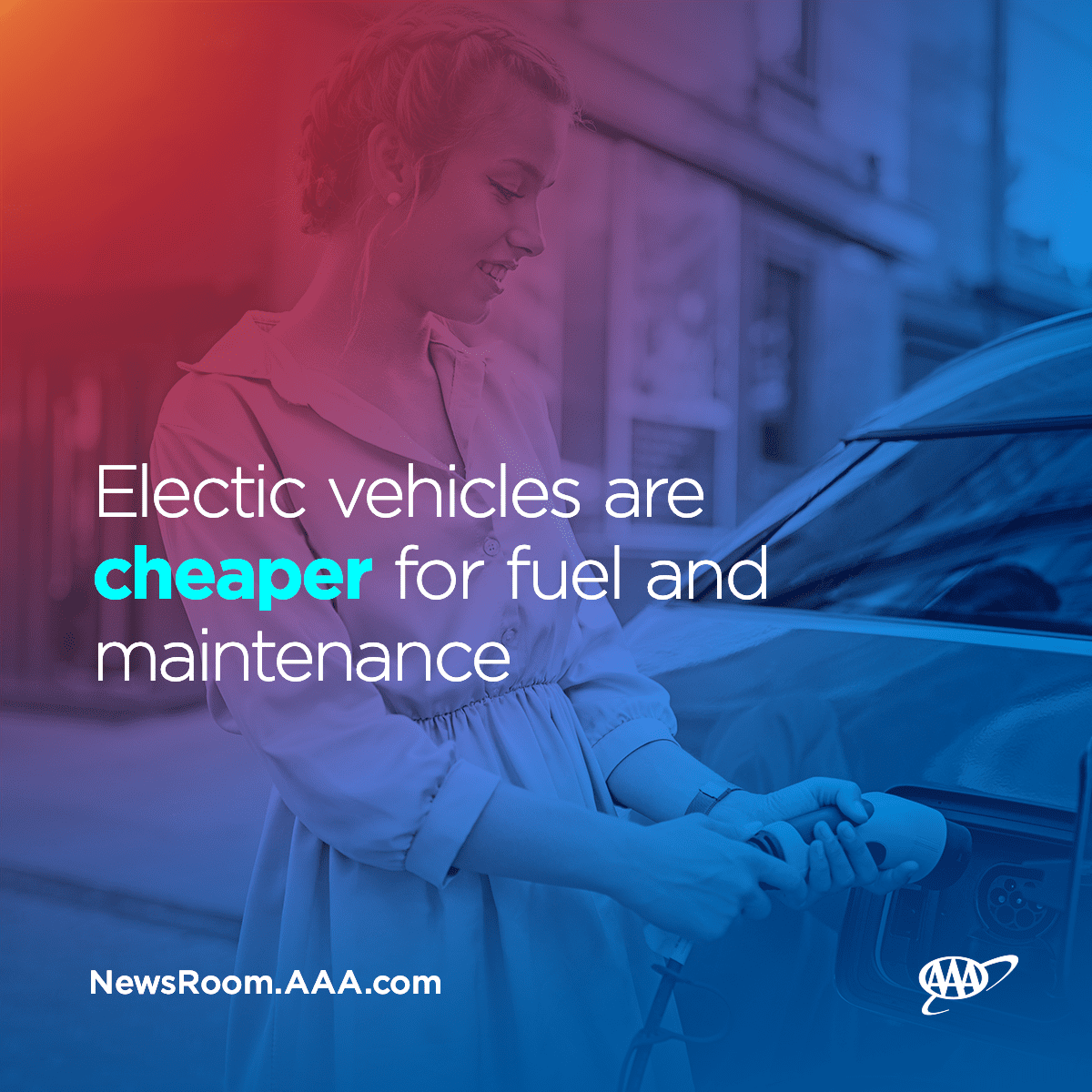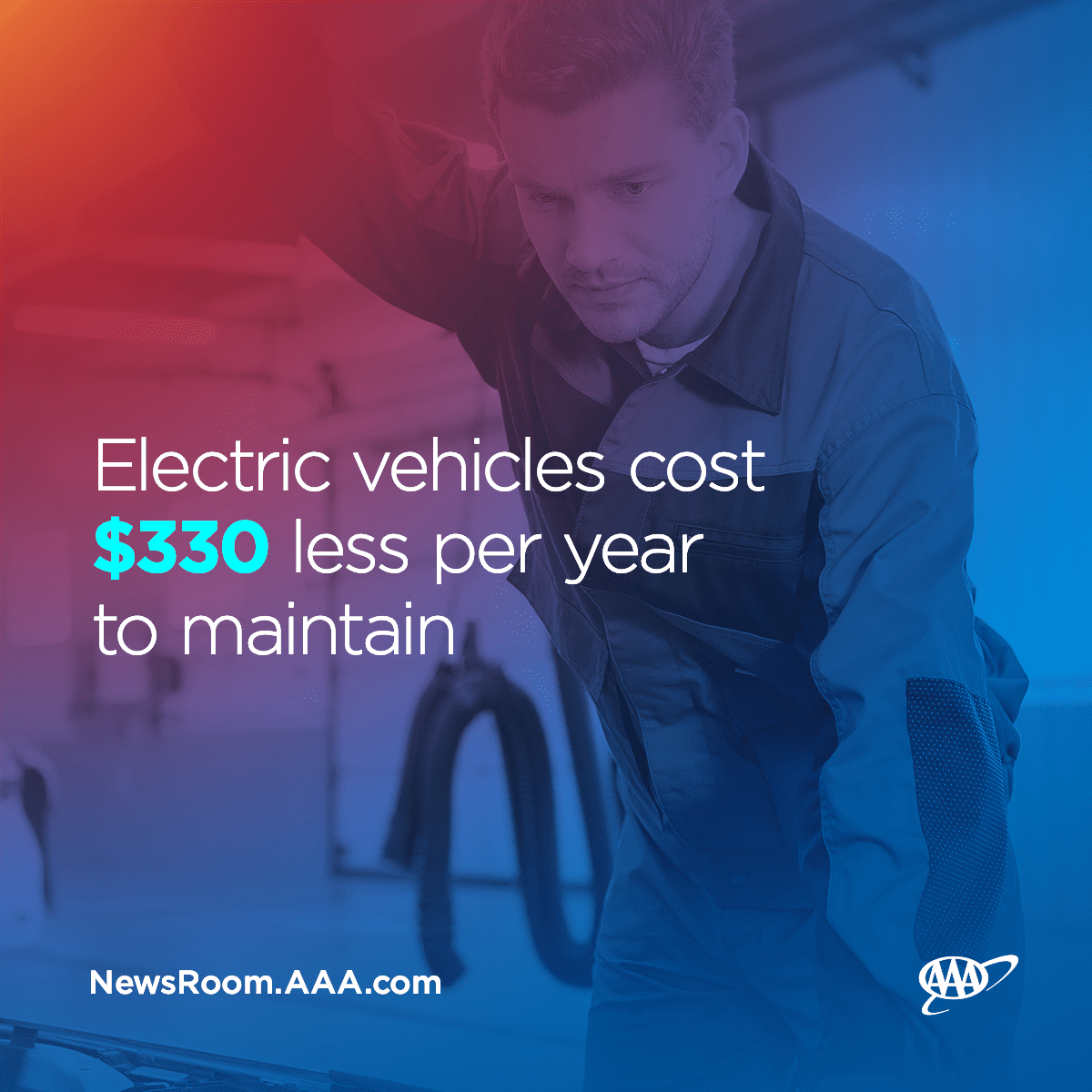Vast Majority of EV owners would buy again
PORTLAND, Ore., – New research from AAA finds that over five years and 75,000 miles of driving, the annual cost of owning a new compact electric vehicle is only slightly more expensive – about $600 annually – than its gas-powered counterpart. The study also revealed that the experience of owning an electric vehicle eases one of the biggest fears associated with these cars – range anxiety. EV owners are also very satisfied with their vehicles—the study shows that 96 percent would buy electric again.
Here is a fact sheet about the survey.
According to AAA’s survey, prior to owning an electric vehicle, a majority of owners (91%) said that they had at least one concern. Insufficient range, implications for long-distance travel and finding a place to charge are the most common. Post purchase, many of these worries disappeared. AAA believes that if consumers have a better understanding of the real cost and experience of owning an electric vehicle, then the gap between expressed interest and adoption will begin to close.
“Although 40 million Americans have said they’d be interested in going electric for their next car, actual adoption is happening at a much slower rate,” says Marie Dodds, public affairs director for AAA Oregon/Idaho. “AAA wanted to learn more about how owning an EV changes the perception of these cars, and whether consumers would choose to buy or lease an EV again. The answer is a resounding yes. Our research shows that a whopping 96 percent of EV owners would get another electric vehicle.”
Oregon hopes to have 50,000 registered electric vehicles on the road by the end of this year. As of January 1, 2020, Oregon had 29,726 registered EVs and 1,656 public chargers in 628 locations. Oregon ranks fifth in the nation when it comes to plug-in vehicles per capita. Find out more at https://goelectric.oregon.gov/
Here are some highlights of AAA’s survey of electric vehicle owners, 71% of whom had not previously owned an electric car:
- The majority (96%) say they would buy or lease another electric vehicle the next time they were in the market for a new car.
- Two in five (43%) say they drive more now than when they owned a gas-powered car. On average, electric vehicle owners drive 39 miles per day.
- Three quarters (78%) also have a gas-powered car in the household, yet they report doing most of their driving (87%) in their electric vehicle.
Perhaps the most surprising result of the survey was the impact ownership has on commonly-held fears about electric vehicles, particularly those that have deterred consumers from making the leap to green:
- Almost all owners surveyed (95%) report never having run out of a charge while driving
- On average, most EV drivers do three fourths (75%) of their charging at home.
- Those who were originally concerned about insufficient range said they became less or no longer concerned post-purchase (77%).
Previous AAA research has found that the top two reasons why Americans shy away from electric vehicles are not enough places to charge (58%) and the fear that they will run out of charge while driving (57%). This latest research shows that these concerns are eased with experience in driving an EV.
“Range anxiety has long been a concern about driving an EV. Hearing firsthand from owners that this is no longer a worry may change the mind of those who have otherwise been skeptical to the idea of driving an electric vehicle,” says Dodds.
Employing the same methodology used for its annual Your Driving Costs study, AAA calculated the costs for owning a new compact electric vehicle as compared to that of its gas-powered counterpart. Although the study found that overall cost of electric vehicle ownership is 8% more per year, individual categories such as fuel and maintenance/repair are lower.
“Electric vehicles can be a great choice for many drivers, and there are more designs and options on the market than ever before,” adds Dodds. “Consumers interested in EVs should learn as much as possible about them. Do research online, talk with friends who own EVs, visit a few dealers and take some EVs on test drives. It’s also important to understand the charging options that are available at your home,” adds Dodds.
Here are details on the costs of a traditional vehicle compared with an EV:
Fuel: The electricity required to drive 15,000 miles per year in a compact EV costs an average of $546, while the amount of gasoline required to drive the same distance in a gas-powered vehicle costs $1,255, which is $709 or 130% more.
Maintenance/repair/tires: Electric vehicles do not require as much maintenance as gas-powered ones since they don’t need oil changes or air-filter replacements. When maintained according to the automakers’ recommendations, EVs cost $949 annually and gas-powered cost $1,279, which is $330 or 35% more.
Insurance: Costs for compact EVs average $1,214, while those for similar gas-powered average $1,328, which is $114 or 9% more.
Depreciation: Regardless of the type of vehicle, depreciation is the single biggest driving cost for any car. The average compact gas-powered vehicle in our study depreciates $2,240 per year, a comparable EV depreciates $4,806, which is $2,566 or 115% higher. Some this increase is because the average EV in our study has a purchase price around 75% higher than the average gas-powered vehicle. The remaining portion may be a result of less demand for used electric vehicles, perhaps because of concerns related to long term reliability. This gap may begin to close as both types of cars enter “middle age” (six years old and beyond) since more than half of their initial value will have already been lost.
Finance: Average costs of the five EVs in our study is $31,888 while the comparable five gas-powered vehicle averages $18,363 – a difference of $13,525. As a result, gas-powered vehicle finance charge average $546 annually, while those for an EV are $768, which is $222 or 41% higher.
Survey Methodology
The electric vehicle and internal combustion engine driving costs in this study were established using the proprietary methodology employed for AAA’s Your Driving Costs (YDC) project. The 2019 electric vehicle models selected for this study were: Chevrolet Bolt (LT), Hyundai Ionic Electric (Base), Kia Soul EV (+), Nissan Leaf (SV) and Volkswagen eGolf (SE). The 2019 internal combustion engine vehicles selected for the comparison were: Chevrolet Cruze (LS), Honda Civic (LX), Hyundai Elantra (SE), Nissan Sentra (SV) and Toyota Corolla (SE). This methodology models the purchase of a new vehicle for personal use over a period of five years and 75,000 miles. A copy of the 2019 AAA Your Driving Costs brochure with the latest study results is available at https://bit.ly/35I5GG8.
The survey of electric vehicle owners was conducted using a consumer panel maintained by a third-party electric vehicle research firm. The online panel consists of more than 40,000 electric vehicles owners, weighted to balance drivers by vehicle type, make and model. In total, 1,090 surveys with plug-in electric vehicle (PEV) owners were completed during a 24-hour period on October 1, 2019.
About AAA
AAA provides more than 60 million members with automotive, travel, insurance and financial services through its federation of 34 motor clubs and nearly 1,100 branch offices across North America. Since 1902, the not-for-profit, fully tax-paying AAA has been a leader and advocate for safe mobility. Drivers can request roadside assistance, identify nearby gas prices, locate discounts, book a hotel or map a route via the AAA Mobile app. To join, visit AAA.com.
AAA news releases, high resolution images, broadcast-quality video, fact sheets and podcasts are available on the AAA NewsRoom at NewsRoom.AAA.com.
Find local news releases at https://www.oregon.aaa.com/category/news-releases/


